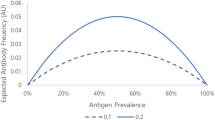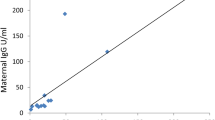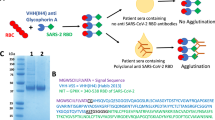Abstract
WE have found significantly higher titres of antistreptolysin O (ASO) in fifty mothers of G1-trisomic children than in fifty age-matched mothers who had borne no children known to be affected with chromosomal aneuploidy. These observations suggest that the mothers of G1-trisomics may be characterized by detectable immunological differences.
This is a preview of subscription content, access via your institution
Access options
Subscribe to this journal
Receive 51 print issues and online access
$199.00 per year
only $3.90 per issue
Buy this article
- Purchase on Springer Link
- Instant access to full article PDF
Prices may be subject to local taxes which are calculated during checkout
Similar content being viewed by others
References
Bauer, J. D., Ackermann, P. G., and Toro, G., Bray's Clinical and Laboratory Methods, seventh ed. (Mosby, St Louis, 1968).
B–D Laboratories, Inc., Technitopics No. 2 (B–D Biological Laboratory, Baltimore, 1961).
Fialkow, P. J., Lancet, i, 474 (1964).
Author information
Authors and Affiliations
Rights and permissions
About this article
Cite this article
ZSAKO, S., KAPLAN, A. Titres of Antistreptolysin O in Mothers of Children affected with Down's Syndrome. Nature 223, 1281–1282 (1969). https://doi.org/10.1038/2231281a0
Received:
Revised:
Issue Date:
DOI: https://doi.org/10.1038/2231281a0
Comments
By submitting a comment you agree to abide by our Terms and Community Guidelines. If you find something abusive or that does not comply with our terms or guidelines please flag it as inappropriate.



